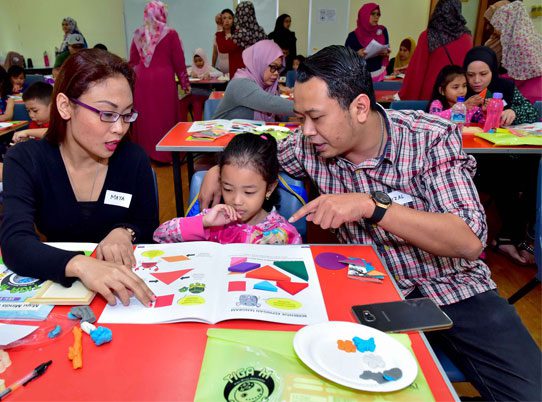



 Primary school preparation isn’t just stressful for parents; it may be even more stressful for our 6-year-olds. Imagine how overwhelmed they must feel transitioning from a small cosy classroom to a formal classroom setting; all that whilst still trying to make sense of the world around them. While the ability to read and write is important, instilling in them the joy and curiosity for learning are equally important. This value is important as we strive for our young ones to be lifelong learners. This was also the message that echoed strongly in the Ministry of Education’s (MOE) “Learn for Life” campaign. Here, we bring you 4 tips on how you can get your child ready for Primary 1 – where a new adventure begins. 1. HAVE A TALK WITH YOUR CHILD Have a chat. Share with them what they can expect to experience and discover at school. Knowing ahead of time the environment and daily routines of life in primary school will make him aware and more at ease. Share your own experiences of school life and most memorable experiences – the friends you made, your favourite teachers and subjects, the games you played during recess, the school camps. Encourage them to talk about their feelings and their concerns about the changes. Conversations like these help them look forward to the new school experience rather than fear or dread it. Remember to consistently assure them of your support. 2. FAMILIARISE YOUR CHILD WITH THE NEW SCHOOL ENVIRONMENT The sheer size of a primary school’s compound and the number of students can be intimidating for your child. School orientations are a good start for your child to feel more at ease. Before the orientation, visit the school website to get your child excited about the facilities and activities it offers. At school orientations, schools will conduct tours of the compound and briefings to parents on what to expect. Walk around the school campus and familiarise your child with important areas like toilets, canteen, and classrooms. 3. GROOMING THEM TO BE INDEPENDENT The moment your child steps into the school on the first day, the need to be independent will hit him hard as parents are restricted from entering the compound. Preparing your child to be independent will help ease their transition. When having a meal outside, encourage your child to buy his own food or send him on an errand to buy grocery items for example. This will expose him to interact and communicate his needs to other adults. At the same time, such activities are excellent opportunities for your child to learn to account for his expenditure. When visiting the library, let them choose, borrow and return their own library books. As a daily habit, let them pack their own school bags, to inculcate a sense of responsibility for their own belongings. This way, it makes them think through what they need the next day. There are many more activities and daily routines that you can use to develop independence in your child. What else can you think of? 4. DEVELOPING A ROUTINE AT HOME Develop a routine at home a month before school starts to get them adjusted to the new school routine. Routines such as going to bed early and waking up early every day are important habits to develop. At home, allocate time for homework, rest and play, meal times and screen time to get them adjusted to the school timetable. Give them basic tasks like washing their own dishes or making their own bed. As parents, manage your own expectations and emotions first so that you do not put too much pressure on your children. The next six years of schooling and beyond will be a time of learning new things. Expose them to new experiences and spend quality time with them. Record their experiences, share in their delight, highs and lows as they embark on this journey of learning and discovery. Wishing the best start to our Primary 1 students and parents in 2019!
Primary school preparation isn’t just stressful for parents; it may be even more stressful for our 6-year-olds. Imagine how overwhelmed they must feel transitioning from a small cosy classroom to a formal classroom setting; all that whilst still trying to make sense of the world around them. While the ability to read and write is important, instilling in them the joy and curiosity for learning are equally important. This value is important as we strive for our young ones to be lifelong learners. This was also the message that echoed strongly in the Ministry of Education’s (MOE) “Learn for Life” campaign. Here, we bring you 4 tips on how you can get your child ready for Primary 1 – where a new adventure begins. 1. HAVE A TALK WITH YOUR CHILD Have a chat. Share with them what they can expect to experience and discover at school. Knowing ahead of time the environment and daily routines of life in primary school will make him aware and more at ease. Share your own experiences of school life and most memorable experiences – the friends you made, your favourite teachers and subjects, the games you played during recess, the school camps. Encourage them to talk about their feelings and their concerns about the changes. Conversations like these help them look forward to the new school experience rather than fear or dread it. Remember to consistently assure them of your support. 2. FAMILIARISE YOUR CHILD WITH THE NEW SCHOOL ENVIRONMENT The sheer size of a primary school’s compound and the number of students can be intimidating for your child. School orientations are a good start for your child to feel more at ease. Before the orientation, visit the school website to get your child excited about the facilities and activities it offers. At school orientations, schools will conduct tours of the compound and briefings to parents on what to expect. Walk around the school campus and familiarise your child with important areas like toilets, canteen, and classrooms. 3. GROOMING THEM TO BE INDEPENDENT The moment your child steps into the school on the first day, the need to be independent will hit him hard as parents are restricted from entering the compound. Preparing your child to be independent will help ease their transition. When having a meal outside, encourage your child to buy his own food or send him on an errand to buy grocery items for example. This will expose him to interact and communicate his needs to other adults. At the same time, such activities are excellent opportunities for your child to learn to account for his expenditure. When visiting the library, let them choose, borrow and return their own library books. As a daily habit, let them pack their own school bags, to inculcate a sense of responsibility for their own belongings. This way, it makes them think through what they need the next day. There are many more activities and daily routines that you can use to develop independence in your child. What else can you think of? 4. DEVELOPING A ROUTINE AT HOME Develop a routine at home a month before school starts to get them adjusted to the new school routine. Routines such as going to bed early and waking up early every day are important habits to develop. At home, allocate time for homework, rest and play, meal times and screen time to get them adjusted to the school timetable. Give them basic tasks like washing their own dishes or making their own bed. As parents, manage your own expectations and emotions first so that you do not put too much pressure on your children. The next six years of schooling and beyond will be a time of learning new things. Expose them to new experiences and spend quality time with them. Record their experiences, share in their delight, highs and lows as they embark on this journey of learning and discovery. Wishing the best start to our Primary 1 students and parents in 2019!